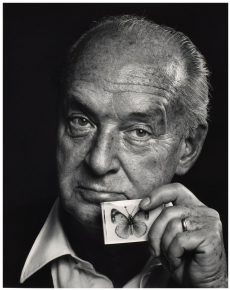
Email: reecejordan98@hotmail.co.uk
Total Article : 168
About Me:18-year-old sixth form student, studying English Literature, History and Government and Politics. My articles will broadly cover topics from the current affairs of politics to reviews of books and albums, as well as adding my own creative pieces, whether it be short fiction or general opinion.

As well as being one of the 20th centuries most prolific authors in creating seminal works such as Lolita and Pale Fire, Vladimir Nabokov was also a professor of English literature, and some of his lectures have been transcribed into print. What we are thus able to gleam from such preservation is insight into the genius mind of Nabokov, and his own notions of what great literature is and what makes a good reader.
One of the most famous quotes from Nabokov on literature is this:
“Literature was not born the day when a boy crying "wolf, wolf" came running out of the Neanderthal valley with a big gray wolf at his heels; literature was born on the day when a boy came crying "wolf, wolf" and there was no wolf behind him.”
This quote is one, I believe, that is the perfect epitome of a condensed version of Nabokov’s view towards literature. This quote alludes to the fable of ‘The Boy Who Cried Wolf’. As is common knowledge, what is usually divined from such a story is a moral, a didactic message – namely, that the more we lie, the more untrustworthy we seem, thus breaking our relationships with people when we need them most. However, Nabokov invests the meaning of fiction and literature within the little boy, the playful incessant liar. Later in his lecture, Nabokov goes on to describe the boy as a ‘little magician’. Indeed, at least in Nabokov’s eyes, the boy, by fabricating a story from his mind has performed an act of conjuration, an act of magic. Moreover, this boy has applied a skill of deception, a key theme that runs throughout much of Nabokov’s work. This quote also reveals Nabokov’s attitude to the separation of art and life – he deems it an injustice to both stories and truth to term anything a ‘true story’.
Another famous quote is this:
“A major writer combines these three – storyteller, teacher, enchanter – but it is the enchanter in him that predominates and makes him a major writer.”
What Nabokov taps into here is the true meaning of masterful writing. It is without question that people may term books to be written by a ‘good writer’ if they have the adept ability to succinctly and engagingly tell their story. We might attribute them the quality of ‘wise’, and extend the praise onto their book if their book appears to ‘teach’ us something. But it is the combination of these two qualities, or, rather, the skill with which these two combine and weave into each other – the masterstrokes that elicit them sweet bodily sensations from literature: the tingling of the spine (as Nabokov seeks to glorify) and the entranced sigh when we, with a warm smile, come to the end of a great book. What this quote also reveals in Nabokov’s attitude towards literature is that it should, at the forefront of its purpose, be compelling, entertaining – enchanting. So much so that the precursor to Lolita was titled The Enchanter, and the premise of the book revolved around the reader becoming enchanted by the protagonist.
Image Credits: wikipedia.co.uk

0 Comment:
Be the first one to comment on this article.